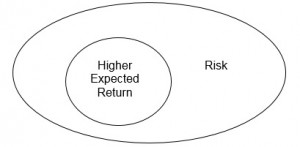The title of this post may be surprising considering one would rarely call term insurance an investment. I don’t sell insurance; however, I think there is investment opportunity in certain situations using a term policy with a return of premium rider (ROPR). Essentially, this is a normal 20- or 30-year level-term life insurance product, but you pay extra premiums and at the end of the term get a refund of all of the funds invested. This means that the time value of money has paid the cost of the insurance. It is also a non-taxable event because, from a tax perspective, you simply received your money (basis) back.
Let’s look at an example. This is very close to being a best-case scenario. It is not typical, but it should get your attention. Assume a 25-year-old male in great health needs $1,000,000 face, 30-year, level-term insurance. It will cost him $770 per year, but he could also get it with ROPR for $1,095 per year “investing” the difference of $325, which is put in at the beginning of each period. At the end of 30 years, he will get back the total premiums or $32,850 ($1,095 x 30 = $32,850).
[Note: It is important to compare the best policy without the rider to the best policy with the rider. Many times the company that offers ROPR doesn’t have the best rates on the insurance without the rider. The “investment” should be the differential between the insurance that would actually be purchased in each case, not a single policy with and without the rider.]
On a financial calculator, the calculation is simply:
In beginning mode (because premiums are paid at the beginning of the period)
N=30 (the number of years)
PV=0 (there is no value initially)
PMT=-325 (this is the amount saved each year, it is negative because it is paid out)
FV=32,850 (this is the amount received at the end, positive because it is coming in)
Solving for I, you get 7.0%
In Excel, the same calculation looks like: =RATE(30,-325,0,32850,1)
This is a guaranteed, after-tax return (assuming you live and pay the premiums) and should be compared to the rate on investment-grade municipals.
Another way to look at it is to assume the funds would be put in CDs instead. If the taxes were paid out of the fund and you are in the 25% federal bracket and a 6% state bracket (combined a 29.5% rate assuming they itemize), the rate needed on the CD to accumulate the same amount of wealth is 9.9% [7/(1-(.25+(1-.25)*.06))]. If you are in the top federal bracket (35%), it would be 7/(1-(.35+(1-.35)*.06)) or 11.5%.
A few caveats:
- Obviously that is significantly higher than current rates, but it is a 30-year program and is thus very illiquid.
- A Roth or IRA would be better if you could get 7% on a guaranteed investment in them.
- Even if you can’t quite get as high a guaranteed return in a tax sheltered account, if the rate difference were small, I would be inclined to use the retirement account for the improved flexibility.
- You must need the insurance anyway for risk reduction. The numbers are abysmal if the insurance is not needed. In that case, the entire amount of the premium is the investment rather than just the differential over the cost of pure insurance.
- In general, the younger and healthier you are, the higher the return.
- Your asset allocation target should be kept in mind. The asset allocation should drive the investment selection rather than the reverse.
- Of course, if the insured dies, he/she paid too much for the insurance, but the probability of dying with a term policy is so low that including that eventuality (and weighting it appropriately) shouldn’t change the results more than a very trivial amount.
You may wonder how the insurance companies can afford to have implied rates this high. I can think of two reasons: 1) lapses allow the insurance company to pay better; and young (healthy) customers are more likely to lapse their coverage, 2) the purchaser of this product has perhaps “signaled” to the insurance company that he/she is a good risk – poor risks wouldn’t tend to buy it. In other words, the purchase of the rider may give useful mortality information to the insurance company that can’t be captured another way.
I ran calculations a few years ago for a male in excellent health at ages 25, 35, and 45; and for 20-year and 30-year time horizons (i.e. six different scenarios). The 20-year policies were not as good relatively speaking, and in one case (35-year-old), a company had a 20-year term policy without the rider priced so attractively that buying the policy with the ROPR would actually be worse than just saving the difference in municipal bonds.
I was also curious if the same results could be achieved with traditional insurance. Because of the much larger contribution amounts, this would be a significant strategy if the numbers were similar. To make equivalent comparisons, I used a non-participating whole life policy so the returns would be just as guaranteed as the previous calculations. I also liquidated the policy at the same 20- and 30-year horizons and compared the results. Unfortunately, the non-participating whole life strategy underperformed buying term insurance and investing the difference in munis by almost 2% per year on average. It also underperformed the term with ROPR strategy by about 2.6% per year – again averaged across the six combinations of age and term. Throwing out the one case where the ROPR shouldn’t be used (see previous paragraph), the difference actually averaged 2.8% annually (again, net of tax).
If an individual is relatively young and healthy, needs life insurance coverage, and can afford to save in an illiquid vehicle, these products are certainly worth investigating.
